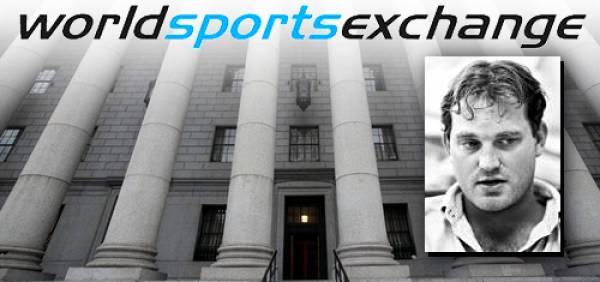Top Legal Journal Features G911’s Somach Talking Rogue World Sports Exchange
The latest issue of the prestigious legal journal "Gaming Law Review and Economics" features an article by Gambling911.com's own Tom Somach.
The article, titled "Story of World's First Internet Sportsbook, World Sports Exchange, Ends Badly," appears in the September, 2016 issue of the journal, which is co-edited by gaming law professors Joseph Kelly of the University of Buffalo and I. Nelson Rose of Whittier College.
The publication, which comes out 10 times a year, examines the various legal issues surrounding the gambling industry and features articles written by noted attorneys, journalists and gambling experts from around the world.
After Somach interviewed Kelly earlier this year for a Gambling911.com article about the remaining fugitive World Sports Exchange co-owner, Haden Ware, being sentenced in court, Kelly asked Somach to write an article for his legal journal about the case.
Somach has covered the World Sports Exchange saga since 1998, when the online sportsbook's three co-owners were busted by Federal authorities in the U.S.
Hollywood has also shown an interest in the case--Somach has had meetings with several movie producers about developing a screenplay about the saga and making a feature film.
A subscription to "Gaming Law Review and Economics" costs several hundred dollars a year, so its articles are not made available free online.
Gambling911.com, however, was able to obtain a copy of the Somach article about World Sports Exchange and reproduces it here for its readers:
STORY OF WORLD'S FIRST INTERNET SPORTSBOOK, WORLD SPORTS EXCHANGE, ENDS BADLY
By Tom Somach
Gaming Law Review and Economics
September, 2016
The final chapter in the long and sordid saga of the world's first Internet sports betting operation was written earlier this year when the last of the company's three co-founders received his punishment after 18 years on the run as a fugitive from justice.
One co-founder had previously turned himself in, faced trial and gone to prison while the other co-founder had killed himself.
The Internet hadn't been around very long when, in 1996, three employees of the Pacific Exchange, a minor stock exchange based in San Francisco, decided to quit their jobs, move to the tiny Caribbean twin-island nation of Antigua and Barbuda and start the world's first online sportsbook--called World Sports Exchange--where people around the world could bet by computer on college and professional sporting events.
Steve Schillinger and Jay Cohen were Pacific Exchange brokers and Haden Ware, a college dropout, was their gofer. Schillinger also doubled as the Exchange's bookmaker, booking sports wagers on the San Francisco 49ers, San Francisco Giants, Golden State Warriors and other teams from Exchange employees.
After one such employee had a particularly bad weekend betting on football with Schillinger and losing a lot of money to him, the employee told his parents what happened and asked them for a loan so he could pay his bookie. Instead of a loan, the parents contacted Pacific Exchange officials and blew the whistle on Schillinger, who was promptly fired.
Schillinger figured he could continue booking sports bets on the nascent Internet, and convinced Cohen and Ware to follow him to a tropical foreign paradise where, they thought, they would be out of the reach of U.S. authorities who might frown on their activities.
World Sports Exchange, called WSEX for short and with the memorable Internet address of www.wsex.com, opened in 1997 and was based in a strip mall in St. John's, the country's capital city on the island of Antigua. Things started off slowly as both the company and the concept of wagering on sports online were largely unknown to the public, but after a year the company had thousands of customers around the world and was making millions of dollars.
Millions of dollars apparently weren't enough for the greedy co-founders. By the start of 1998, Cohen was doing dozens of media interviews to promote WSEX and in one, said the company was capable of making "billions with a b." What turned out to be the last straw was when Cohen was interviewed by Sports Illustrated and taunted U.S. authorities to come after him if they thought he was doing anything illegal, which Cohen assured S.I. he wasn't.
The Feds thought otherwise. In the spring of 1998, Cohen, Schillinger, Ware and 18 other Americans who were involved in the operation of half a dozen Internet sportsbooks and casinos in foreign lands were charged by the U.S. Justice Dept. with violating the Federal Wire Act of 1961, which prohibits the use of telephone lines for gambling. That law was enacted during the administration of President John F. Kennedy and Attorney General Robert F. Kennedy used it to go after one of organized crime's top money-making rackets, booking sports bets. The Internet in 1998 operated over telephone lines, so although some thought it was a stretch to apply the law in this case, the Feds didn't. Those charged were dubbed the "Internet 21" by the media.
Most of the "Internet 21" immediately returned to the U.S. and turned themselves in. A few had their charges dropped or dismissed, while the rest copped pleas, with none getting prison time, just fines and/or house arrest. Several "Internet 21" members, including Schillinger and Ware, remained abroad as fugitives from justice, continuing to run their lucrative online gambling businesses.
Only one of the "Internet 21" returned to the U.S. and demanded a trial on the charges--Cohen. He would be found guilty after a long jury trial in Federal Court in Manhattan and would be sentenced to 18 months in a Federal prison in, of all places, Las Vegas, where sports betting is legal.
After Cohen got out of prison, his probation stipulated he was not to be involved with WSEX any more. Cohen ignored that and returned to Antigua, where he resumed running WSEX with fugitives Schillinger and Ware.
A few years later, the trio at WSEX decided they weren't making enough money, so they decided to stop paying their winning customers. What were those customers going to do, call the police and admit they were betting illegally over the 'Net? The customers couldn't do anything, as the online sports betting industry wasn't regulated by anyone with any authority. More loot for Cohen, Schillinger and Ware. A website that tracks the online sports betting industry calculated, from reports from stiffed WSEX customers, that WSEX owed hundreds of customers a total of several million dollars.
Then, in early 2013, WSEX posted an announcement on its website that it was pulling the plug on itself and going out of business. No explanation for the demise was given. Customers owed money who were hoping against hope that they'd eventually get their funds were now officially out of luck.
A few days after the announcement was posted, Schillinger was found dead, of a gunshot wound to the head, in his luxury condo in St. John's. Antiguan police said the gun was illegally owned and a suicide note was found near the body.
One co-founder dead, the other jailed. The last co-founder, Ware, had remained on the run after WSEX's demise, running other online gambling operations in Europe, then South America.
But after 18 years on the run, Ware, who had been busted in 1998 as one of the "Internet 21," turned himself in to U.S. authorities in New York in January of 2016. In May, he appeared in court in New York where a judge sentenced him for the 1998 charges. Ware got probation, no prison time, no fine. The judge indicated Ware's 18 years in exile were punishment enough.
There was no mention by the judge or Ware of the millions of dollars owed to WSEX customers.
(Tom Somach is a freelance journalist who has covered the Internet gambling industry since its inception in the mid-1990s. He has written about the industry for various newspapers and websites, including the San Francisco Chronicle, San Francisco Examiner, New York Times, Edmonton Journal, Las Vegas Sporting News, Gambling911.com, BettorsWorld.com, RGTOnline.com and PokerHelper.com. He can be reached at tomsomach@yahoo.com.)















